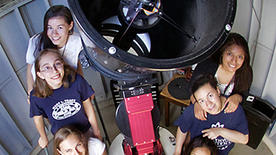
Yale’s Department of Astronomy is launching the Yale Summer Program in Astrophysics (YSPA), an innovative program for high school students that combines rigorous study and research with an immersive learning environment. The inaugural program will be held at Yale’s Leitner Family Observatory and Planetarium July 10 through Aug. 7, 2016.
YSPA is a four-week residential research and enrichment program for 28 rising high school seniors who are interested in math, science, computer programming, and other tech fields. Students will take classes in physics, math, and astronomy; complete a scientific research project using telescopes at Yale; learn the basics of computer programming and data science; and present their results at the end of the program, which will be offered annually.
Michael Faison, YSPA’s academic director and founder, said the program is designed “to find exceptionally bright high school students from around the world who maybe haven’t been challenged at their home schools, bring them to Yale, let them interact as much as possible with each other and our talented faculty, give them a challenging curriculum and research project to complete, and let them find out for themselves what they can accomplish. This type of experience can be a huge boost to their self-confidence, and it gives them a big head start on college and a career in science.”
Organizers said the main goals of YSPA are: to provide students with the opportunity to be academically and personally challenged in a professional scientific research setting; to accelerate the personal growth of students by giving them the opportunity to live and work in a university environment with other high school seniors from around the world who have similar interests in math and science; and to teach students practical skills in math, computer programming, data analysis, statistics, writing, and research methods — skills that are essential in all science, engineering, and tech fields.
“In the YSPA curriculum, we do teach practical skills,” Faison said, “but even more importantly, we teach the students patience, attention to detail, teamwork, and how to plug away at a real scientific research problem and make progress when the answers aren’t in the back of the textbook.”
YSPA program coordinator Kimberly Nucifora said that in addition to academics, the program’s social environment will be unique. “YSPA sets up a close community of scholars for the duration of the program, and this community will continue with students and faculty keeping in touch with each other long after the program is over,” Nucifora said. “There are quite a few opportunities for fun enrichment activities embedded into the YSPA program, including guest lectures, movie nights in the planetarium, field trips off campus, and lots of other fun activities around Yale and New Haven.”
Yale’s on-campus observatory and planetarium gives the program an added dimension, according to Faison. “The Leitner Family Observatory and Planetarium at Yale is a fantastic facility for an intensive summer program like this,” he said. “We will have classes in the planetarium theater, which will allow us to use the planetarium projector as an instructional tool. Students will use our 16-inch and 12-inch telescopes to collect data with their research teams in our computer lab. Having everything we need in one place will make things go much more smoothly, and the students can take over the building for the four weeks of the program and make the space their own.”
Students in the program are required to complete a two-week online study course before the residential program begins. The YSPA application deadline for students in the United States is 8 p.m. ET on March 6, 2016; for international students, the application deadline is Feb. 7, 2016. Need-based financial aid of up to 50% is available for those accepted into the program.
For more information, visit the YSPA website.
- YaleNews press release